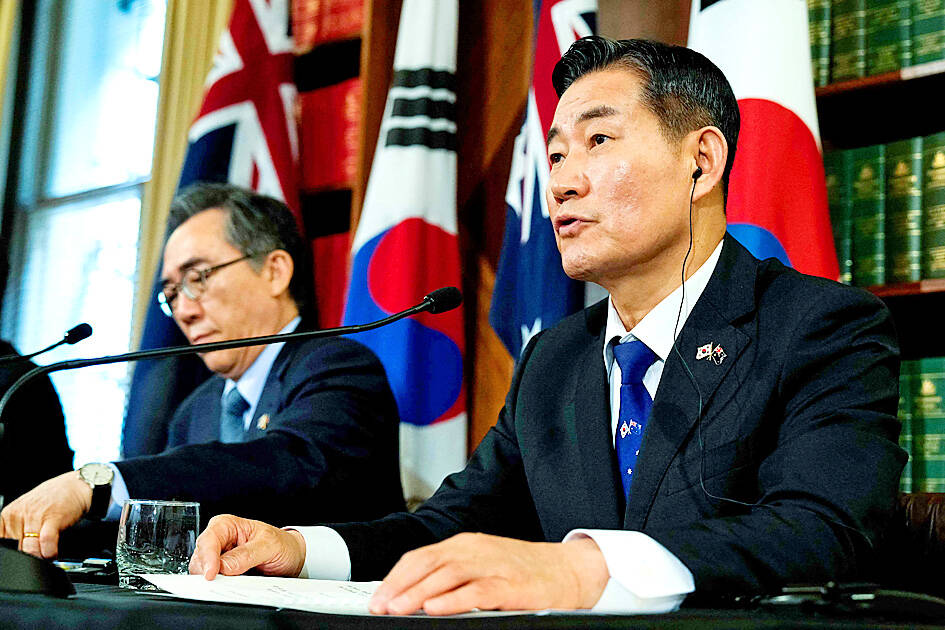South Korea is considering sharing advanced military technology with the US, the UK and Australia through the so-called AUKUS partnership, South Korean Minister of National Defense Shin Won-sik said yesterday.
The possibility was discussed during two days of meetings between South Korea and Australia’s defense and foreign ministers that ended in Melbourne yesterday, Shin said.
The US and the UK in 2021 agreed to provide Australia with a fleet of submarines powered by US nuclear technology under the AUKUS agreement to counter a growing military presence from China. AUKUS is an acronym for Australia, the UK and the US.

Photo: AFP
The countries could become involved in cooperation on a wider range of security technologies including artificial intelligence, electronic warfare and hypersonic systems through what is known as AUKUS Pillar II.
Shin welcomed South Korea’s invitation from the three AUKUS partners.
“We do welcome that AUKUS members are considering [South] Korea as an AUKUS Pillar II partner and Korea’s defense science and technology capabilities will contribute to the peace and stability of the development of AUKUS Pillar 2 and regional peace,” Shin said.
Japan is also moving toward formal talks to become part of AUKUS Pillar II’s technology development and sharing.
Australian Minister for Defense Richard Marles welcomed South Korean efforts to build on its relationship with Japan, which along with Australia, the US and India form a security dialogue known as the Quadrilateral Security Dialogue.
“We see this is a very, very positive step forward in the strategic landscape of the region and represents a huge opportunity for Australia to engage with both [South] Korea and Japan,” Marles told reporters.
“[South] Korea and Australia are working together to uphold the rules-based order within our region and, in fact, within the world,” Marles added.

‘ABUSE OF POWER’: Lee Chun-yi allegedly used a Control Yuan vehicle to transport his dog to a pet grooming salon and take his wife to restaurants, media reports said Control Yuan Secretary-General Lee Chun-yi (李俊俋) resigned on Sunday night, admitting that he had misused a government vehicle, as reported by the media. Control Yuan Vice President Lee Hung-chun (李鴻鈞) yesterday apologized to the public over the issue. The watchdog body would follow up on similar accusations made by the Chinese Nationalist Party (KMT) and would investigate the alleged misuse of government vehicles by three other Control Yuan members: Su Li-chiung (蘇麗瓊), Lin Yu-jung (林郁容) and Wang Jung-chang (王榮璋), Lee Hung-chun said. Lee Chun-yi in a statement apologized for using a Control Yuan vehicle to transport his dog to a

BEIJING’S ‘PAWN’: ‘We, as Chinese, should never forget our roots, history, culture,’ Want Want Holdings general manager Tsai Wang-ting said at a summit in China The Mainland Affairs Council (MAC) yesterday condemned Want Want China Times Media Group (旺旺中時媒體集團) for making comments at the Cross-Strait Chinese Culture Summit that it said have damaged Taiwan’s sovereignty, adding that it would investigate if the group had colluded with China in the matter and contravened cross-strait regulations. The council issued a statement after Want Want Holdings (旺旺集團有限公司) general manager Tsai Wang-ting (蔡旺庭), the third son of the group’s founder, Tsai Eng-meng (蔡衍明), said at the summit last week that the group originated in “Chinese Taiwan,” and has developed and prospered in “the motherland.” “We, as Chinese, should never

‘A SURVIVAL QUESTION’: US officials have been urging the opposition KMT and TPP not to block defense spending, especially the special defense budget, an official said The US plans to ramp up weapons sales to Taiwan to a level exceeding US President Donald Trump’s first term as part of an effort to deter China as it intensifies military pressure on the nation, two US officials said on condition of anonymity. If US arms sales do accelerate, it could ease worries about the extent of Trump’s commitment to Taiwan. It would also add new friction to the tense US-China relationship. The officials said they expect US approvals for weapons sales to Taiwan over the next four years to surpass those in Trump’s first term, with one of them saying

INDO-PACIFIC REGION: Royal Navy ships exercise the right of freedom of navigation, including in the Taiwan Strait and South China Sea, the UK’s Tony Radakin told a summit Freedom of navigation in the Indo-Pacific region is as important as it is in the English Channel, British Chief of the Defence Staff Admiral Tony Radakin said at a summit in Singapore on Saturday. The remark came as the British Royal Navy’s flagship aircraft carrier, the HMS Prince of Wales, is on an eight-month deployment to the Indo-Pacific region as head of an international carrier strike group. “Upholding the UN Convention on the Law of the Sea, and with it, the principles of the freedom of navigation, in this part of the world matters to us just as it matters in the